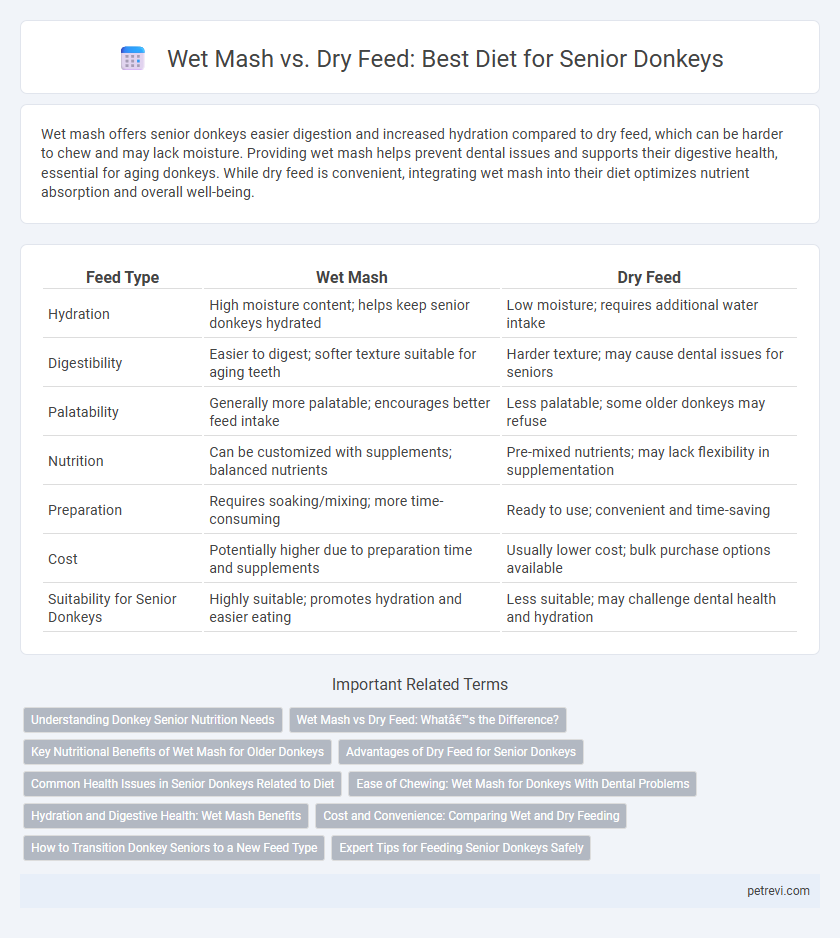Wet mash offers senior donkeys easier digestion and increased hydration compared to dry feed, which can be harder to chew and may lack moisture. Providing wet mash helps prevent dental issues and supports their digestive health, essential for aging donkeys. While dry feed is convenient, integrating wet mash into their diet optimizes nutrient absorption and overall well-being.
Table of Comparison
| Feed Type | Wet Mash | Dry Feed |
|---|---|---|
| Hydration | High moisture content; helps keep senior donkeys hydrated | Low moisture; requires additional water intake |
| Digestibility | Easier to digest; softer texture suitable for aging teeth | Harder texture; may cause dental issues for seniors |
| Palatability | Generally more palatable; encourages better feed intake | Less palatable; some older donkeys may refuse |
| Nutrition | Can be customized with supplements; balanced nutrients | Pre-mixed nutrients; may lack flexibility in supplementation |
| Preparation | Requires soaking/mixing; more time-consuming | Ready to use; convenient and time-saving |
| Cost | Potentially higher due to preparation time and supplements | Usually lower cost; bulk purchase options available |
| Suitability for Senior Donkeys | Highly suitable; promotes hydration and easier eating | Less suitable; may challenge dental health and hydration |
Understanding Donkey Senior Nutrition Needs
Senior donkeys require diets tailored to their aging digestive systems, where wet mash offers improved hydration and easier digestion compared to dry feed. Wet mash, made from soaked grains and chopped forage, supports nutrient absorption and reduces the risk of impaction colic common in older donkeys. Prioritizing wet mash aligns with senior donkeys' decreased chewing ability and helps maintain their optimal weight and health.
Wet Mash vs Dry Feed: What’s the Difference?
Wet mash for senior donkeys contains higher moisture content, which aids digestion and hydration, reducing the risk of colic and impaction. Dry feed offers concentrated nutrients and longer shelf life but requires sufficient water intake to prevent dehydration. Choosing between wet mash and dry feed depends on the donkey's dental health, digestive condition, and hydration needs.
Key Nutritional Benefits of Wet Mash for Older Donkeys
Wet mash provides senior donkeys with enhanced hydration and easier digestibility, crucial for aging digestive systems. The high moisture content supports kidney function and helps prevent colic, while the softened fibers facilitate nutrient absorption and reduce dental strain. Including wet mash in an older donkey's diet ensures balanced energy and essential vitamins, promoting overall health and longevity.
Advantages of Dry Feed for Senior Donkeys
Dry feed offers senior donkeys a stable source of essential nutrients and fiber, supporting digestive health and preventing complications such as colic. It is easier to store and less prone to spoilage compared to wet mash, ensuring consistent feed quality. Moreover, dry feed helps maintain dental health by encouraging natural chewing behavior that wears down teeth effectively.
Common Health Issues in Senior Donkeys Related to Diet
Senior donkeys often face common health issues such as dental problems, reduced digestive efficiency, and obesity, which make selecting wet mash over dry feed crucial. Wet mash aids in easier mastication and digestion, reducing the risk of impaction and dental wear, while dry feed can exacerbate chewing difficulties and dehydration in aging donkeys. Providing wet mash ensures better nutrient absorption and hydration, addressing the unique dietary needs of senior donkeys to maintain optimal health.
Ease of Chewing: Wet Mash for Donkeys With Dental Problems
Wet mash is significantly easier for donkey seniors with dental problems to chew compared to dry feed, reducing stress during mealtime and ensuring adequate nutrient intake. The moisture in wet mash softens the food, helping donkeys with weakened or missing teeth consume their diet comfortably. Maintaining proper dental health and preventing weight loss in older donkeys is more manageable with this soft-textured feeding option.
Hydration and Digestive Health: Wet Mash Benefits
Wet mash feed for senior donkeys significantly enhances hydration by providing additional moisture, which is crucial for preventing dehydration, especially in older animals with reduced water intake. The increased water content in wet mash also supports digestive health by softening fibrous materials, promoting easier digestion and improving nutrient absorption. Incorporating wet mash helps maintain electrolyte balance and reduces the risk of colic and impaction, common digestive issues in aging donkeys.
Cost and Convenience: Comparing Wet and Dry Feeding
Wet mash for senior donkeys often incurs higher costs due to increased water usage and spoilage risks, while dry feed tends to be more economical and shelf-stable. Dry feed offers convenience in storage and handling, requiring less preparation time compared to wet mash, which demands frequent mixing and monitoring. Choosing between wet mash and dry feed depends on balancing cost efficiency with the ease of feeding management for aging donkeys.
How to Transition Donkey Seniors to a New Feed Type
Transitioning donkey seniors from dry feed to wet mash requires gradual introduction over 10-14 days to prevent digestive upset. Begin by mixing small amounts of wet mash with their current dry feed, steadily increasing the wet portion while reducing dry feed to support digestive adaptation. Regularly monitor hydration and stool consistency to ensure the donkey adjusts well to the moisture-rich feed and maintains optimal health.
Expert Tips for Feeding Senior Donkeys Safely
Senior donkeys require carefully balanced nutrition to maintain optimal health, with wet mash offering easier digestion and hydration compared to dry feed. Experts recommend incorporating wet mash to prevent dental strain and promote nutrient absorption, especially for donkeys with compromised teeth or digestive issues. Regularly monitoring weight and hydration levels ensures that feeding practices meet the specific needs of senior donkeys, supporting longevity and wellbeing.
Wet mash vs Dry feed for Donkey Seniors Infographic

 petrevi.com
petrevi.com